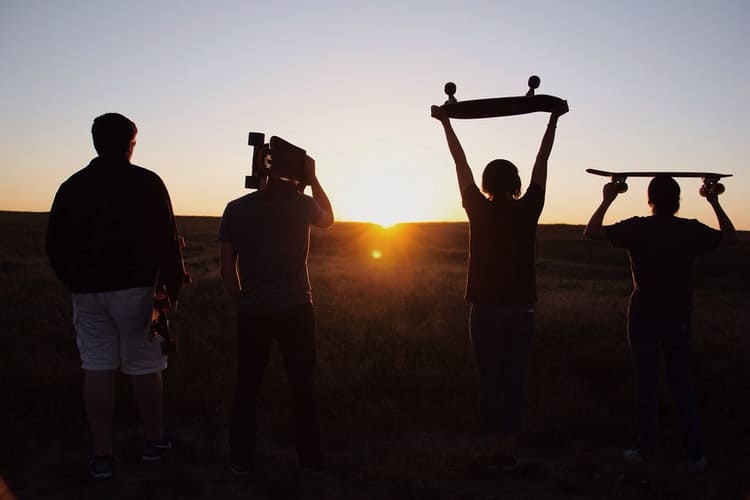- The end of a close friendship can really hurt – and to make matters worse, you might end up missing the person you’d usually turn to for help
- When a friendship can’t be salvaged, you may find yourself stuck in a grieving process
- Here is our advice on how to recover from a friend break-up and reassess what a great friendship means to you
Losing a friend can feel like losing a limb – regardless of whether you’ve cut ties with them or they’ve left you behind. It can be every bit as painful and confusing as a romantic break-up, and yet we’re often ill-equipped to deal with the emotional fallout.
In particular, when a major row has driven you and a friend apart, your usual shoulder-to-cry-on might not be there anymore. It can feel very alienating to lose that support network – but that’s not to say a friendship break-up is all doom and gloom. It can be an opportunity to reflect, to reconsider what you need and expect from a friend, and to create new connections with different social circles.
Here are our top tips on how to move past a friendship break-up, and how to learn and figure out what you want your future friendships to look like.
Adjust to the change

A strong friendship can be years in the making – which can make a friendship break-up all the more heart-wrenching.
One 2018 study by the University of Kansas estimated that friendships typically form after 80-100 hours together. A “good” friendship, the study suggests, tends to solidify after 200 hours in each other’s company.
As you come to terms with the absence of a long-time friend, you can invest more time in the other people around you and fortify your existing friendships. It might even be a chance to rekindle old friendships, as well as to reconnect with family.

As you adjust to the break-up, take care not to over-scrutinise your own actions. Self-blame can often be an unrealistic reflection of why a friendship ended.
“It can be easy to think that if your friend broke up with you, something is wrong with you,” Dr Benjamin Ritter says. “If you mistreated them you really need to reflect on your actions and self, but the majority of the time in friendship breakups it’s just that your friend is on a different path than you.”
At the end of the day, you may need to show yourself kindness. “Recognise the language you’re using when you’re talking about yourself, instead of jumping to labels like calling yourself a bad friend,” suggests Miriam Kirmayer, a clinical therapist. “Speak to yourself the way you would a good friend.”
Forge new friendships

“Though you may not realise it until years later, the end of a friendship can actually be positive in the long run,” says psychotherapist Rhonda Richards-Smith.
“Know that if you are unable to reconcile with a friend, it may free you up for other amazing friendships and experiences in the future,” she explains.
A friend break-up can leave a vaccuum in your life, both in the sense of time and emotional support. This could be a great time to join new clubs, spend more time with workmates or classmates, or hang out with a different friend’s friendship group.

However, you shouldn’t feel like you have to find a new best friend straight away. This is an important time to evaluate the kind of friendships you want to build in future – and what qualities will help make your friendships last.
Therapist Melody Li recommends asking yourself, “What are some values that are important to you when looking for new friends? What are some meaningful characteristics that you have, that you hope your new friends will have too? What are some red flags that may warn you that the new friends may not be a healthy fit?”
By learning from this friendship break-up, you can avoid future crises, and spot the kind of friends who will stick with you through thick and thin.
Enjoy your own company

Changing up your routine can help you to move past a friendship – and it doesn’t have to be all about restructuring your social life. Spending time alone, whether you’re treating yourself, pursuing new hobbies or going on solo adventures, can be hugely rewarding.
Dr. Andrea Bonior suggests that you use “the same coping techniques that help boost mood in other circumstances – exercise, time outdoors, expressing gratitude, looking to help others, spending time with people whose company [you] enjoy, [and] learning new things.”
What’s more, when you’re dealing with the loss of a friend, Healthline recommends private reflection as well as speaking to others – and highlights the power of journaling.

“In a journal, you don’t have to hold back or censor yourself,” the website notes. “You can freely express anything, from sadness to disappointment to rage. Emotions given shape through written words can seem more real – and easier to acknowledge and process.”
Healthline also points out that you can use a journal to preserve positive thoughts about friendships of the past. “Journaling also offers the opportunity to recall happier memories,” it states. “No matter what circumstances ended your friendship, treasuring the moments you shared can still have value.”
Remember that time heals

While it may feel unnatural to lose a friendship, it’s actually normal for friend groups to change drastically over time.
As the blog for the teen treatment group Evolve notes, “when you’re in a close friendship, you might think you two will always stay this close. But friendships don’t always last forever, despite your expectations.” Their website points out that, “although this friendship may be over, know that as you move on in life, you’ll keep making friends – and they’ll keep enriching your life, just as you’ll enrich theirs.”
It’s important to bear in mind that, while the journey to finding the best of friends can be daunting and may be interspersed with lonelier spells, it will be worth it in the long run.

